- Home
- Ken Follett
The Evening and the Morning
The Evening and the Morning Read online
ALSO BY KEN FOLLETT
The Modigliani Scandal
Paper Money
Eye of the Needle
Triple
The Key to Rebecca
The Man from St. Petersburg
On Wings of Eagles
Lie Down with Lions
The Pillars of the Earth
Night over Water
A Dangerous Fortune
A Place Called Freedom
The Third Twin
The Hammer of Eden
Code to Zero
Jackdaws
Hornet Flight
Whiteout
World Without End
Fall of Giants
Winter of the World
Edge of Eternity
A Column of Fire
Notre-Dame
VIKING
An imprint of Penguin Random House LLC
penguinrandomhouse.com
Copyright © 2020 by Ken Follett
Penguin supports copyright. Copyright fuels creativity, encourages diverse voices, promotes free speech, and creates a vibrant culture. Thank you for buying an authorized edition of this book and for complying with copyright laws by not reproducing, scanning, or distributing any part of it in any form without permission. You are supporting writers and allowing Penguin to continue to publish books for every reader.
LIBRARY OF CONGRESS CATALOGING-IN-PUBLICATION DATA
Names: Follett, Ken, author.
Title: The evening and the morning / Ken Follett.
Description: New York: Viking, [2020] | Series: The Kingsbridge series
Identifiers: LCCN 2019051791 (print) | LCCN 2019051792 (ebook) | ISBN 9780525954989 (hardcover) | ISBN 9781984882028 (ebook)
Subjects: GSAFD: Historical fiction.
Classification: LCC PR6056.O45 E88 2020 (print) | LCC PR6056.O45 (ebook) | DDC 823/.914—dc23
LC record available at https://lccn.loc.gov/2019051791
LC ebook record available at https://lccn.loc.gov/2019051792
Map on pp. x-xi by Daren Cook
This is a work of fiction. Apart from the historical figures, any resemblance between fictional characters created by the author and actual persons, living or dead, is purely coincidental.
Cover design: Daren Cook
Cover art: Ireland, Book of Kells, eighth century, Trinity College Library, Dublin. Dennis Hallinan / Alamy Stock Photo
pid_prh_5.6.0_c0_r0
In memoriam,
E. F.
Contents
Cover
Also by Ken Follett
Title Page
Copyright
Dedication
Epigraph
Map
Part I: The Wedding (997 CE)
Chapter 1: Thursday, June 17, 997
Chapter 2: Saturday, June 19, 997
Chapter 3: Late June 997
Chapter 4: Early July 997
Chapter 5: Late July 997
Chapter 6: Early August 997
Chapter 7: Late August 997
Chapter 8: Early September 997
Chapter 9: Mid−September 997
Chapter 10: Late September 997
Chapter 11: Early October 997
Chapter 12: Mid−October 997
Chapter 13: Late October 997
Chapter 14: November 1, 997
Chapter 15: December 31, 997
Part II: The Trial (998 CE)
Chapter 16: January 998
Chapter 17: February 998
Chapter 18: March 998
Chapter 19: June 998
Chapter 20: July 998
Chapter 21: September 998
Chapter 22: October 998
Chapter 23: November 1, 998
Chapter 24: December 998
Part III: The Murder (1001–1003 CE)
Chapter 25: January 1001
Chapter 26: March 1001
Chapter 27: April 1001
Chapter 28: May 1001
Chapter 29: August and September 1001
Chapter 30: February 1002
Chapter 31: June 1002
Chapter 32: July 1002
Chapter 33: August 1002
Chapter 34: October 1002
Chapter 35: March 1003
Chapter 36: June 1003
Chapter 37: August 1003
Part IV: The City (1005–1007 CE)
Chapter 38: November 1005
Chapter 39: Spring 1006
Chapter 40: Summer 1006
Chapter 41: September 1006
Chapter 42: October 1006
Chapter 43: January 1007
Acknowledgments
About the Author
When the Roman Empire declined, Britain went backward. As the Roman villas crumbled, the people built one-room wooden dwellings without chimneys. The technology of Roman pottery—important for storing food—was mostly lost. Literacy declined.
This period is sometimes called the Dark Ages, and progress was painfully slow for five hundred years.
Then, at last, things started to change . . .
CHAPTER 1
Thursday, June 17, 997
t was hard to stay awake all night, Edgar found, even on the most important night of your life.
He had spread his cloak over the reeds on the floor and now he lay on it, dressed in the knee-length brown wool tunic that was all he wore in summer, day and night. In winter he would wrap the cloak around him and lie near the fire. But now the weather was warm: Midsummer Day was a week away.
Edgar always knew dates. Most people had to ask priests, who kept calendars. Edgar’s elder brother Erman had once said to him: “How come you know when Easter is?” and he had replied: “Because it’s the first Sunday after the first full moon after the twenty-first day of March, obviously.” It had been a mistake to add “obviously,” because Erman had punched him in the stomach for being sarcastic. That had been years ago, when Edgar was small. He was grown now. He would be eighteen three days after Midsummer. His brothers no longer punched him.
He shook his head. Random thoughts sent him drifting off. He tried to make himself uncomfortable, lying on his fist to stay awake.
He wondered how much longer he had to wait.
He turned his head and looked around by firelight. His home was like almost every other house in the town of Combe: oak-plank walls, a thatched roof, and an earth floor partly covered with reeds from the banks of the nearby river. It had no windows. In the middle of the single room was a square of stones surrounding the hearth. Over the fire stood an iron tripod from which cooking pots could be hung, and its legs made spidery shadows on the underside of the roof. All around the walls were wooden pegs on which were hung clothes, cooking utensils, and boatbuilding tools.
Edgar was not sure how much of the night had passed, because he might have dozed off, perhaps more than once. Earlier, he had listened to the sounds of the town settling for the night: a couple of drunks singing an obscene ditty, the bitter accusations of a marital quarrel in a neighboring house, a door slamming and a dog barking and, somewhere nearby, a woman sobbing. But now there was nothing but the soft lullaby of waves on a sheltered beach. He stared in the direction of the door, looking for telltale lines of light around its edges, and saw only darkness. That meant either that the moon had set, so the night was well advanced, or that the sky was cloudy, which would tell him nothing.
The rest of his family lay around the room, close to the walls where there was less smoke. Pa and Ma were back-to-back. Sometimes they would wake in the middle of the night and embrace, whispering and moving together, until they fell back, panting; but they were fast asleep now, Pa snoring. Erman, the eldest brother at twenty, lay near Edgar, and Eadbald, the middle one, was in the corner. Edgar could hear their steady, untroubled breathing.
At last, the church bell struck.
There was a monastery on the far side of the town. The monks had a way of measuring the hours of the night: they made big, graduated candles that told the time as they burned down. One hour before dawn they would ring the bell, then get up to chant their service of Matins.
Edgar lay still a little longer. The bell might have disturbed Ma, who woke easily. He gave her time to sink back into deep slumber. Then, at last, he got to his feet.
Silently he picked up his cloak, his shoes, and his belt with its sheathed dagger attached. On bare feet he crossed the room, avoiding the furniture: a table, two stools, and a bench. The door opened silently: Edgar had greased the wooden hinges yesterday with a generous smear of sheep’s tallow.
If one of his family woke now and spoke to him, he would say he was going outside to piss, and hope they did not spot that he was carrying his shoes.
Eadbald grunted. Edgar froze. Had Eadbald woken up, or just made a noise in his sleep? Edgar could not tell. But Eadbald was the passive one, always keen to avoid a fuss, like Pa. He would not make trouble.
Edgar stepped out and closed the door behind him carefully.
The moon had set, but the sky was clear and the beach was starlit. Between the house and the high-tide mark was a boatyard. Pa was a boatbuilder, and his three sons worked with him. Pa was a good craftsman and a poor businessman, so Ma made all the money decisions, especially the difficult calculation of what price to ask for something as complicated as a boat or ship. If a customer tried to bargain down the price, Pa would be willing to give in, but Ma would make him stand firm.
Edgar glanced at the yard as he laced his shoes and buckled his belt. There was only one vessel under construction, a small boat for rowing upriver. Beside it stood a large and valuable stockpile of timber, the trunks split into halves and quarters, ready to be shaped into the parts of a boat. About once a month the whole family went into the forest and felled a mature oak tree. Pa and Edgar would begin, alternately swinging long-handled axes, cutting a precise wedge out of the trunk. Then they would rest while Erman and Eadbald took over. When the tree came down, they would trim it then float the wood downriver to Combe. They had to pay, of course: the forest belonged to Wigelm, the thane to whom most people in Combe paid their rent, and he demanded twelve silver pennies for each tree.
As well as the timber pile, the yard contained a barrel of tar, a coil of rope, and a whetstone. All were guarded by a chained-up mastiff called Grendel, black with a gray muzzle, too old to do much harm to thieves but still able to bark an alarm. Grendel was quiet now, watching Edgar incuriously with his head resting on his front paws. Edgar knelt down and stroked his head. “Good-bye, old dog,” he murmured, and Grendel wagged his tail without getting up.
Also in the yard was one finished vessel, and Edgar thought of it as his own. He had built it himself to an original design, based on a Viking ship. Edgar had never actually seen a Viking—they had not raided Combe in his lifetime—but two years ago a wreck had washed up on the beach, empty and fire blackened, its dragon figurehead half smashed, presumably after some battle. Edgar had been awestruck by its mutilated beauty: the graceful curves, the long serpentine prow, and the slender hull. He had been most impressed by the large out-jutting keel that ran the length of the ship, which—he had realized after some thought—gave the stability that allowed the Vikings to cross the seas. Edgar’s boat was a lesser version, with two oars and a small, square sail.
Edgar knew he had a talent. He was already a better boatbuilder than his elder brothers, and before long he would overtake Pa. He had an intuitive sense of how forms fitted together to make a stable structure. Years ago he had overheard Pa say to Ma: “Erman learns slowly and Eadbald learns fast, but Edgar seems to understand before the words are out of my mouth.” It was true. Some men could pick up a musical instrument they had never played, a pipe or a lyre, and get a tune out of it after a few minutes. Edgar had such instincts about boats, and houses, too. He would say: “That boat will list to starboard,” or: “That roof will leak,” and he was always right.
Now he untied his boat and pushed it down the beach. The sound of the hull scraping on the sand was muffled by the shushing of the waves breaking on the shore.
He was startled by a girlish giggle. In the starlight he saw a naked woman lying on the sand, and a man on top of her. Edgar probably knew them, but their faces were not clearly visible and he looked away quickly, not wanting to recognize them. He had surprised them in an illicit tryst, he guessed. The woman seemed young and perhaps the man was married. The clergy preached against such affairs, but people did not always follow the rules. Edgar ignored the couple and pushed his boat into the water.
He glanced back at the house, feeling a pang of regret, wondering whether he would ever see it again. It was the only home he could remember. He knew, because he had been told, that he had been born in another town, Exeter, where his father had worked for a master boatbuilder; then the family had moved, while Edgar was still a baby, and had set up home in Combe, where Pa had started his own enterprise with one order for a rowboat; but Edgar could not remember any of that. This was the only home he knew, and he was leaving it for good.
He was lucky to have found employment elsewhere. Business had slowed since the renewal of Viking attacks on the south of England when Edgar was nine years old. Trading and fishing were dangerous while the marauders were near. Only the brave bought boats.
There were three ships in the harbor now, he saw by starlight: two herring fishers and a Frankish merchant ship. Dragged up on the beach were a handful of smaller craft, river and coastal vessels. He had helped to build one of the fishers. But he could remember a time when there had always been a dozen or more ships in port.
He felt a fresh breeze from the southwest, the prevailing wind here. His boat had a sail—small, because they were so costly: a full-size sail for a seagoing ship would take one woman four years to make. But it was hardly worthwhile to unfurl for the short trip across the bay. He began to row, something that hardly taxed him. Edgar was heavily muscled, like a blacksmith. His father and brothers were the same. All day, six days a week, they worked with ax, adze, and auger, shaping the oak strakes that formed the hulls of boats. It was hard work and it made strong men.
His heart lifted. He had got away. And he was going to meet the woman he loved. The stars were brilliant; the beach glowed white; and when his oars broke the surface of the water, the curling foam was like the fall of her hair on her shoulders.
Her name was Sungifu, which was usually shortened to Sunni, and she was exceptional in every way.
He could see the premises along the seafront, most of them workplaces of fishermen and traders: the forge of a tinsmith who made rustproof items for ships; the long yard in which a roper wove his lines; and the huge kiln of a tar maker who roasted pine logs to produce the sticky liquid with which boatbuilders waterproofed their vessels. The town always looked bigger from the water: it was home to several hundred people, most making their living, directly or indirectly, from the sea.
He looked across the bay to his destination. In the darkness he would not have been able to see Sunni even if she had been there, which he knew she was not, since they had arranged to meet at dawn. But he could not help staring at the place where she soon would be.
Sunni was twenty-one, older than Edgar by more than three years. She had caught his attention one day when he was sitting on the beach staring at the Viking wreck. He knew her by sight, of course�
��he knew everyone living in the small town—but he had not particularly noticed her before and did not recall anything about her family. “Were you washed up with the wreck?” she had said. “You were sitting so still, I thought you were driftwood.” She had to be imaginative, he saw right away, to say something like that off the top of her head; and he had explained what fascinated him about the lines of the vessel, feeling that she would understand. They had talked for an hour and he had fallen in love.
Then she told him she was married, but it was already too late.
Her husband, Cyneric, was thirty. She had been fourteen when she married him. He had a small herd of milk cows, and Sunni managed the dairy. She was shrewd, and made plenty of money for her husband. They had no children.
Edgar had quickly learned that Sunni hated Cyneric. Every night, after the evening milking, he went to an alehouse called the Sailors and got drunk. While he was there, Sunni could slip into the woods and meet Edgar.
However, from now on there would be no more hiding. Today they would run away together; or, to be exact, sail away. Edgar had the offer of a job and a house in a fishing village fifty miles along the coast. He had been lucky to find a boatbuilder who was hiring. Edgar had no money—he never had money, Ma said he had no need of it—but his tools were in a locker built into the boat. They would start a new life.
As soon as everyone realized they had gone, Cyneric would consider himself free to marry again. A wife who ran away with another man was, in practice, divorcing herself: the Church might not like it, but that was the custom. Within a few weeks, Sunni said, Cyneric would go into the countryside and find a desperately poor family with a pretty fourteen-year-old daughter. Edgar wondered why the man wanted a wife: he had little interest in sex, according to Sunni. “He likes to have someone to push around,” she had said. “My problem was that I grew old enough to despise him.”
Cyneric would not come after them, even if he found out where they were, which was unlikely at least for some time to come. “And if we’re wrong about that, and Cyneric finds us, I’ll beat the shit out of him,” Edgar had said. Sunni’s expression had told him that she thought this was a foolish boast, and he knew she was right. Hastily, he had added: “But it probably won’t come to that.”

 The Pillars of the Earth
The Pillars of the Earth Eye Of The Needle
Eye Of The Needle Lie Down With Lions
Lie Down With Lions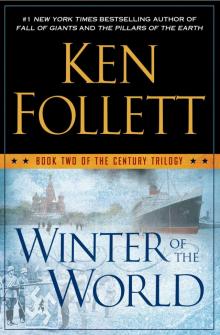 Winter of the World
Winter of the World Triple
Triple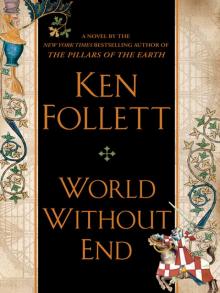 World Without End
World Without End Fall of Giants
Fall of Giants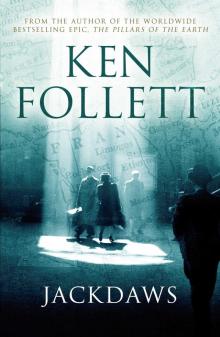 Jackdaws
Jackdaws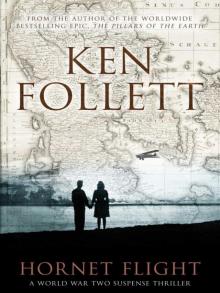 Hornet Flight
Hornet Flight Whiteout
Whiteout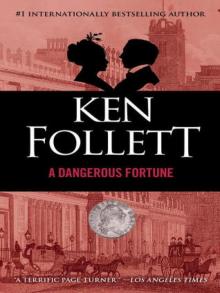 A Dangerous Fortune
A Dangerous Fortune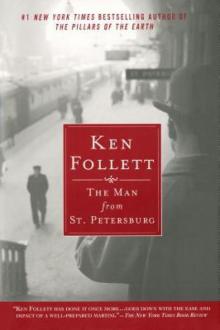 The Man From St. Petersburg
The Man From St. Petersburg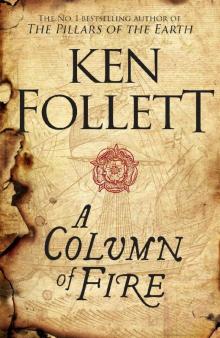 A Column of Fire
A Column of Fire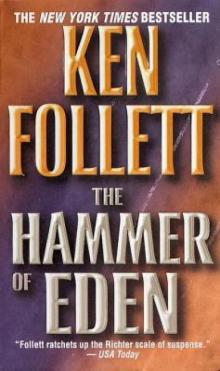 The Hammer of Eden
The Hammer of Eden On Wings of Eagles
On Wings of Eagles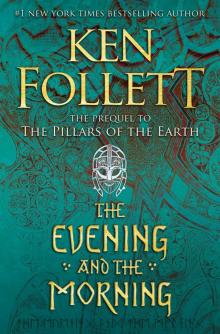 The Evening and the Morning
The Evening and the Morning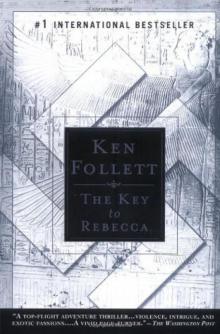 The Key to Rebecca
The Key to Rebecca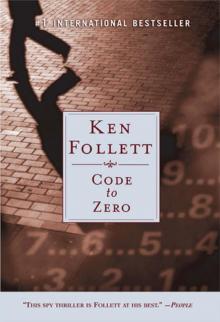 Code to Zero
Code to Zero Paper Money
Paper Money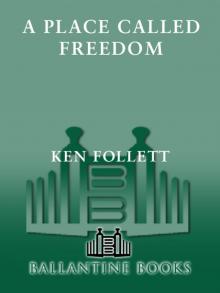 A Place Called Freedom
A Place Called Freedom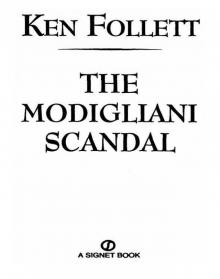 The Modigliani Scandal
The Modigliani Scandal Triple (1991)
Triple (1991)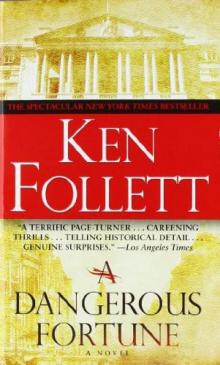 A Dangerous Fortune (1994)
A Dangerous Fortune (1994)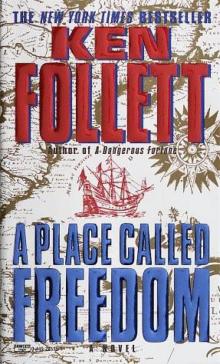 A Place Called Freedom (1995)
A Place Called Freedom (1995)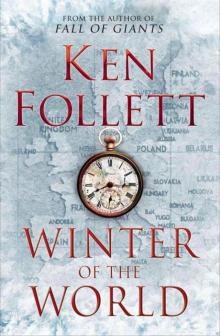 Winter of the World (Century Trilogy 2)
Winter of the World (Century Trilogy 2) Code to Zero (2000)
Code to Zero (2000) On Wings Of Eagles (1990)
On Wings Of Eagles (1990) Storm Island
Storm Island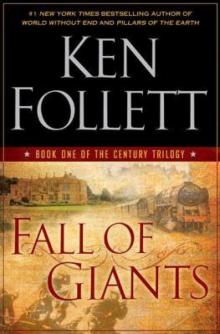 Fall of Giants (The Century Trilogy)
Fall of Giants (The Century Trilogy)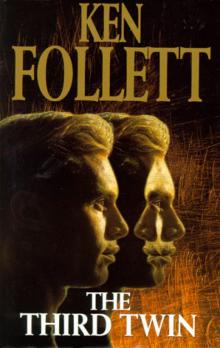 the Third Twin (1996)
the Third Twin (1996)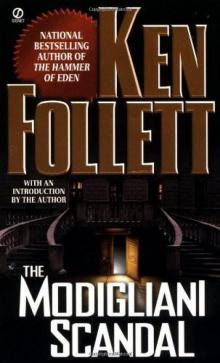 The Modigliani Scandal (1976)
The Modigliani Scandal (1976)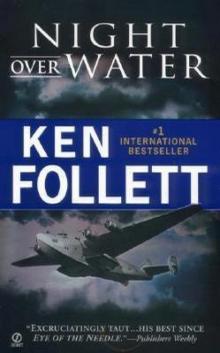 Night Over Water
Night Over Water